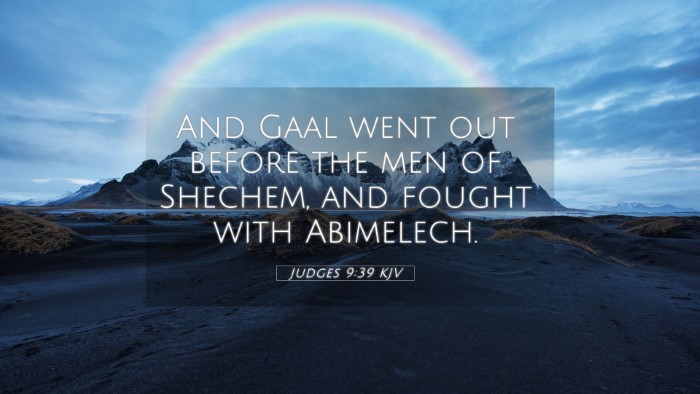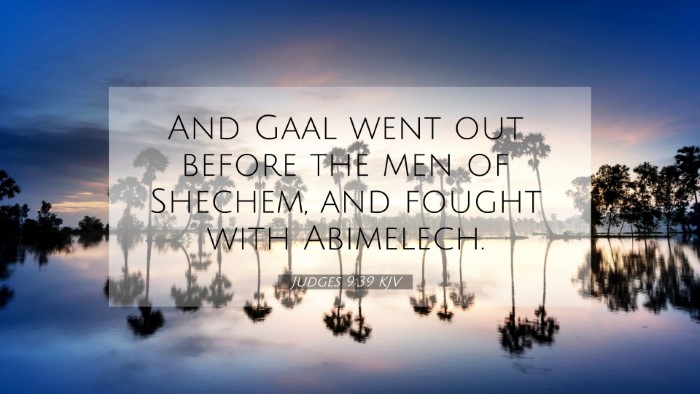Understanding Judges 9:39
Judges 9:39
In this verse, we find the aftermath of Abimelech’s assault on the city of Shechem. The context of this verse sheds light on the tumultuous leadership of Abimelech and highlights themes of rebellion and the consequences of choices made by leaders.
Verse Overview
Judges 9:39 states: "Then Gaal went out before the men of Shechem, and fought with Abimelech." This brief statement encapsulates a significant clash in the narrative of the judges, where Gaal emerges as a challenger against Abimelech, who was instated through treachery.
Commentary Insights
The commentaries by Matthew Henry, Albert Barnes, and Adam Clarke delve into the implications and the moral lessons embedded in this verse:
-
Matthew Henry:
Henry notes that the event signifies a turning point as Gaal represents the voice of the people of Shechem rising against the oppressive rule of Abimelech. This highlights the theme of divine justice where God raises opposition against corrupt leadership.
-
Albert Barnes:
Barnes provides a historical context, detailing how Gaal’s revolt illustrates the fragility of Abimelech’s rule. His observations emphasize that the actions taken by Abimelech, filled with moral shortcomings, create a path for unrest and rebellion among the people he governs.
-
Adam Clarke:
Clarke elaborates on Gaal's character and motivations, pointing out that his confidence against Abimelech was fueled by the discontent within Shechem. He suggests that this reflects the divine principle where the oppressed often rise against despotism and that such uprisings, though fraught with danger, are seen in biblical narratives as part of God’s justice.
Thematic Connections
Judges 9:39 engages with broader themes throughout the Scriptures, particularly with respect to leadership, rebellion, and the cyclical nature of Israel's history:
-
Leadership and Rebellion:
This narrative ties closely to previous accounts of rebellion against unjust leaders, reflecting a continuous struggle throughout biblical history.
-
Justice and Judgment:
The verse acts as a precursor to divine retribution themes where God raises adversaries to correct the course of ungodly leaders.
Cross-References
The following verses provide meaningful connections to Judges 9:39, enhancing understanding through scriptural cross-referencing:
- Judges 8:34-35: This verse highlights Israel's forgetfulness of God's deliverance, setting the stage for the need of leadership that reflects God's will.
- 2 Samuel 15:1-12: Reflects another instance of rebellion against a king, drawing parallels between aspiring leaders and their often disastrous follies.
- 1 Kings 12:16: Illustrates the division of Israel, mirroring the conflict faced by Abimelech.
- Psalms 75:7: "But God is the judge: he puts down one, and sets up another," introducing themes of divine sovereignty over human leadership struggles.
- Matthew 20:26-28: Examines the nature of true leadership in contrast to that of Abimelech's tyrannical rule.
- Isaiah 53:3: Reflects on the rejection of the Righteous One, similar to the way Abimelech was challenged.
- Romans 13:1: The principle of divine order in governance, juxtaposed against Abimelech's illegitimate claim to power.
Practical Applications
Understanding Judges 9:39 can lead to several practical applications in contemporary faith living:
- Recognizing the importance of righteous leadership and the consequences of turning away from God's appointed leaders.
- Emphasizing the courage to stand against unjust leadership or oppression in any community, drawing strength from God’s promises of justice.
- Encouraging investigations into the roles of individuals in ensuring God's justice prevails, reflecting on personal and communal responsibilities.
Conclusion
In summary, Judges 9:39 serves as a pivotal moment within the Book of Judges, highlighting the complexities of leadership and the power dynamics that arise within a community. Through a combination of prophetic insights and historical narratives, one can glean valuable lessons about justice, rebellion, and the nature of God’s judgment across multiple scripture passages.
By utilizing tools for Bible cross-referencing, individuals can deepen their understanding of this verse and its connections within the broader biblical narrative, contributing to a more enriched faith journey.


